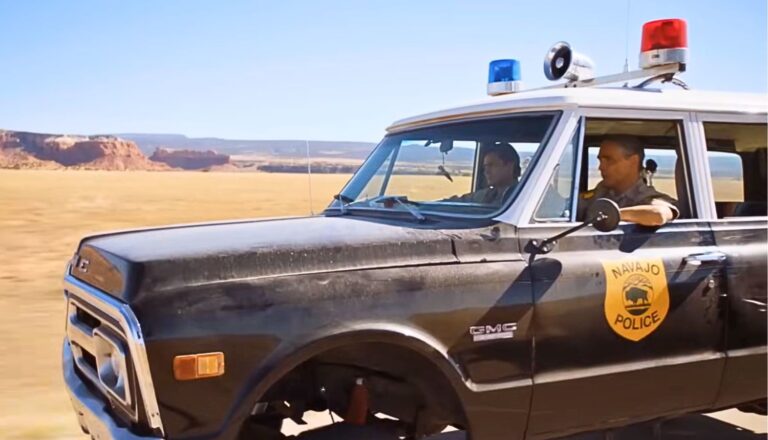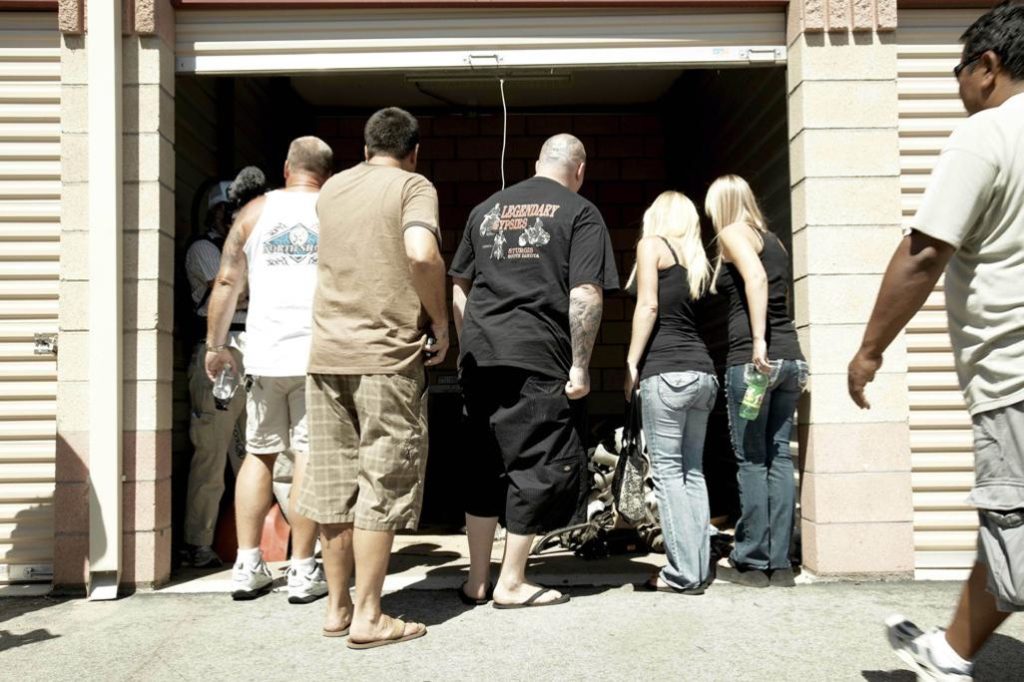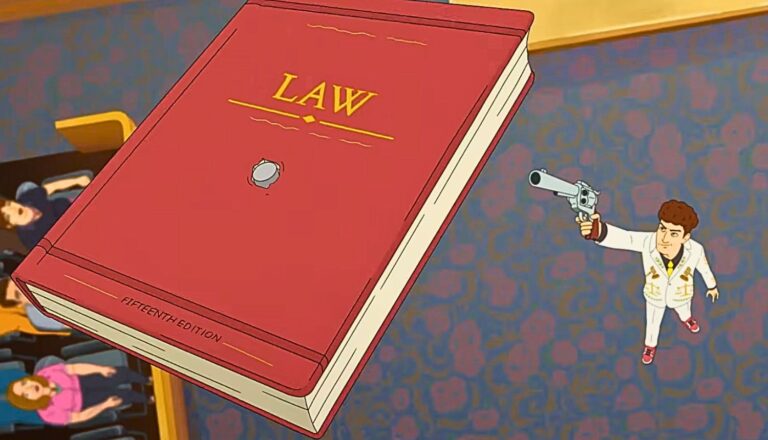
Dark Winds
AMC+ brings to life a murder-mystery series set in New Mexico, steeped in Navajo ways and filled with dark magic.

In the holiday classic, Rudolph the Red-Nosed Reindeer tells us that unloved toys go to an island ruled by a flying lion. So where, then, do unloved storage lockers go?
To auction, that’s where.
That’s the sobering lesson of A&E’s red-hot Storage Wars, where the mysterious contents of unpaid-for storage facilities are sold to the highest bidder. It’s a little like American Pickers, only with less history and more swearing. Oh, and the quirky owners are nowhere in sight.
Storage Wars—the second-season premiere of which became the highest-rated show in A&E history—focuses on four professional locker buyers who traverse California searching for buried treasure—that is, treasure buried underneath old mattresses and broken lamps. A&E gives each buyer a nickname to help us pigeonhole these characters into handy-dandy archetypes: Dave “The Mogul” Hester, the intimidator who annoys everyone by hollering “yuuup!” as he bids; Darrell “The Gambler” Sheets, the tank top-wearing good ol’ boy yin to Dave’s yang; Barry “The Collector” Weiss, a bespectacled, Jaguar-driving eccentric who seems to buy lockers on the merest of whims; and the married duo of Jarrod “The Young Gun” Schulz and Brandi Passante, trying to make a name for themselves in this curiously cutthroat biz.
In each episode, these diehard storage warriors bid on storage units—always called lockers here—that have, essentially, been foreclosed: The original renters stopped paying, leaving the facilities’ owners free to do as they please with the contents. And what they please is to conduct auctions. The auctioneers allow interested parties a five-minute look-see … but they can’t actually go into the lockers or pick up anything, meaning most of the contents are a mystery. An old wardrobe could hold a couple of Monets or a couple of wasp’s nests. The dusty safe in the corner might be filled with collectable coins or a few severed fingers. You just never know.
Superficially, Storage Wars bears some resemblance to History Channel’s Pawn Stars and American Pickers. All are hinged to the concept of finding treasure in the dusty detritus of the past. But in those prime-time competitors, the focus is on the stuff itself and the history behind it. An old bat may give Pawn Stars an excuse to talk about Lou Gehrig, for instance. In Storage Wars, a bat is just a bat. These locker relics are rarely so interesting. And a pile of old tools might be all Jarrod and Brandi unearth after a buy. And they’re thrilled at the prospect.
Rusty wrenches, of course, can only hold viewers’ interest for so long. As a consequence, Storage Wars winds up being mostly about the money—and the competition between the bidders. How much are those still-packaged particle-board desks worth? Will Barry be able to sell that old metal toy for enough to make back the $800 he spent on the locker? Can Darrell drive up the price of a locker simply so Dave’ll have to pay more for it? The show dutifully tracks the characters’ profit or loss each week. And it’s all punctuated by the grinding theme song with the oft-repeated line, “Money owns this town.”
No surprise, then, that a certain cynicism permeates Storage Wars. A&E drums up the personal rivalries, giving us the impression that these folks don’t like each other much. They curse frequently. Their personal interview segments—where characters share their thoughts and feelings directly to the camera—are often snarky and can feel stilted and staged. Storage Wars may aspire to be Antiques Roadshow, but it more often feels like Real Housewives.
All of which, in a way, accentuates an underlying darkness. Each locker, after all, was once owned by someone who put stuff they valued in it. Then, each locker was, for one reason or another, abandoned. Did the owner die? Could she not pay the meager storage bill? Did he just forget all about it? We never see any of those stories. And that’s on purpose. “All you see is misery there, and I didn’t want to trade on that,” executive producer Thom Beers told USA Today.
As such, these unwanted, unpaid-for lockers feel a little like carcasses left alongside the road of consumerism, and the show’s storage warriors are its vultures, swooping in to pick ’em clean.
(Editor’s Note: Plugged In is rarely able to watch every episode of a given series for review. As such, there’s always a chance that you might see a problem that we didn’t. If you notice content that you feel should be included in our review, send us an email at letters@pluggedin.com, or contact us via Facebook or Instagram, and be sure to let us know the episode number, title and season so that we can check it out.)
The storage warriors head north to the San Francisco area. Dave comes in with high hopes, and he tries to bully his fellow bidders by pulling his massive “yuuup”-branded truck into the middle of the proceedings. The truck’s arrival is punctuated with Darth Vader-like theme music. “A little intimidation goes a long way,” he says.
Ironically, then, Dave leaves San Francisco empty-handed. Darrell bids $2,800 on a locker carrying about $17,000 worth of office equipment, while Jarrod and Brandi snag one that contains surveillance gear. When Jarrod views Brandi through one of the devices, he quips that she looks better on TV—and she flips him off. (Her finger is pixelated.) Barry buys a locker that contains an antique metal toy featuring two pugilists. He plans to have the item appraised, and he quips, “I can’t wait to show him my old boxers.”
We hear “a‑‑” twice, “p‑‑‑ed” once and more than a half-dozen stronger swears that are bleeped. God’s name is misused at least 10 times; Jesus’ once.

Paul Asay has been part of the Plugged In staff since 2007, watching and reviewing roughly 15 quintillion movies and television shows. He’s written for a number of other publications, too, including Time, The Washington Post and Christianity Today. The author of several books, Paul loves to find spirituality in unexpected places, including popular entertainment, and he loves all things superhero. His vices include James Bond films, Mountain Dew and terrible B-grade movies. He’s married, has two children and a neurotic dog, runs marathons on occasion and hopes to someday own his own tuxedo. Feel free to follow him on Twitter @AsayPaul.

AMC+ brings to life a murder-mystery series set in New Mexico, steeped in Navajo ways and filled with dark magic.

‘Strip Law’ is Netflix’s next carbon-copy adult animated comedy whose unoriginality extends even into its crass content.

Liars prosper in ‘Can You Keep a Secret?’ on Paramount+ as Debbie Fendon pretends her husband is dead to keep his life-insurance money.

Filled with gritty violence and foul language, when it comes to this German spy drama, “unfamiliar” is how most viewers should stay.